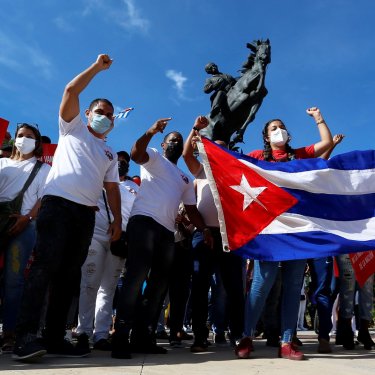Cuba urged to free reporters under house arrest or jailed since a wave of protests a month ago

Reporters Without Borders (RSF) calls on the Cuban authorities to release the ten reporters currently under house arrest or in prison as a result of the crackdown on journalists during an unprecedented wave of anti-government protests throughout the island in July. The authorities must also drop all proceedings against these journalists, RSF says.
The victims include Camila Acosta, the Spanish daily ABC’s correspondent, who was arrested as she left her Havana home on 12 July to accompany her father to get a PCR test. She has been under house arrest for most of the past month for covering the protests against President Miguel Díaz-Canel’s government that erupted on 11 July.
Spanish Prime Minister Pedro Sánchez called for her release on 13 July, describing her detention as “inappropriate.” She was placed under house arrest on 16 July after after being held incommunicado for four days. She told ABC that, before transferring her to house arrest, the police tried to get her to sign a statement saying she accepted a “public order disturbance” charge and the accompanying fine.
She was detained again by State Security for several hours on 27 July when she left her home to question police officers about the arrest of the brother of the friend who is currently providing her with accommodation – an arrest she regarded as an act of intimidation.
Acosta has been detained in the past and has been harassed repeatedly by State Security agents and government supporters, leading her to change her place of residence several times. She can no longer leave the island because, along with well-known government opponents and anti-regime activists, she has been placed on a list of people who are “regulated.” She remains under house arrest awaiting trial on charges of disturbing public order and inciting crime that carry a possible one-year prison sentence.
A total of 15 journalists were threatened, attacked, arrested or placed under house arrest by State Security during or shortly after the anti-government protests. A month later, nine are still held under house arrest on charges of disturbing public order, inciting crime or “epidemic propagation,” or on no charge at all.
The nine still under house arrest are Camila Acosta (ABC and Cubanet), Neife Rigau (La Hora de Cuba), Henry Constantin Ferreiro (La Hora de Cuba), Iris Mariño (La Hora de Cuba), Iliana Hernández Cardosa (CiberCuba), Hector Luis Valdés Cocho (ADN Cuba), Niober García Fournier (Cubanet and Palenque Vision), María Matienzo Puerto (a freelancer) and Luz Escobar (14 y Medio).
State Security intimidation
One journalist is still jailed. He is Orelvys Cabrera, a reporter for the independent news website Cubanet. He was arrested on 11 July while covering a protest in Cárdenas, a town in Matanzas province 150 km east of Havana, and has been held ever since pending trial on a still unknown date.
“This crackdown on independent journalists is unfortunately not surprising because the Cuban regime has made a habit of arresting and detaining journalists arbitrarily,” said Emmanuel Colombié, the head of RSF’s Latin America bureau. “We urge the Cuban authorities to release the journalists under house arrest and to drop all the charges against them. Journalists are just doing their job when they cover protests.”
When journalists are not being held arbitrarily, they are liable to be subjected to State Security intimidation. On 24 July, ten days after the anti-government protests, freelancer Waldo Fernández Cuenca was stopped by plainclothesmen, who took him to a police station, questioned him for two hours and told him he would be prosecuted on a public order disturbance charge if he covered another protest like the one on 11 July. Before releasing him they fined him 2,000 pesos (70 euros) for violating Covid-19 health measures.
Raúl Castro’s protégé, Miguel Díaz-Canel, replaced Castro as Cuba’s president in 2019 and then as first secretary of the Communist Party of Cuba as well in April of this year. He was also included in the list of press freedom predators that RSF published in July.
He maintains almost total control over news and information in Cuba. His government keeps a tight grip on all state TV, radio and print media while the constitution bans privately-owned media. Journalists who don’t toe the party line are subjected to harassment, persecution, arbitrary detention, the threat of imprisonment, illegal home searches and the confiscation and destruction of their equipment. And they are closely watched by State Security agents who try to restrict their freedom of movement, subject them to frequent brief arrests and often delete information from their phones.
Cuba is ranked 171st out of 180 countries in RSF's 2021 World Press Freedom Index.



